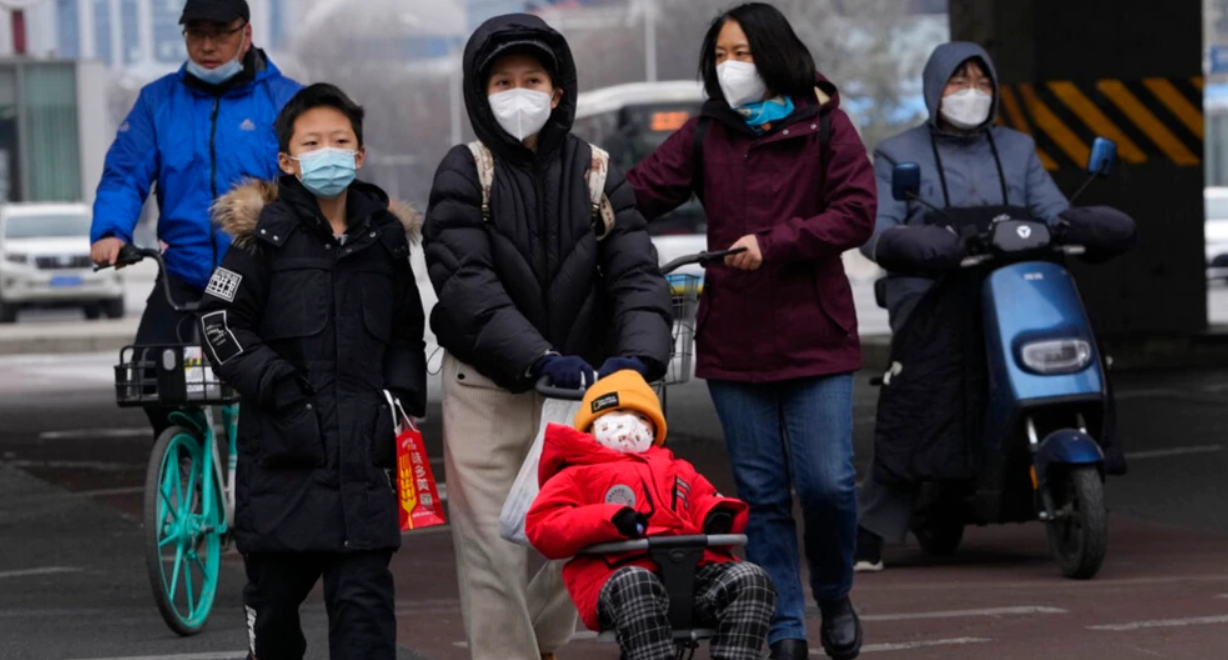BEIJING: Days after protests erupted in China over the country’s strict zero-COVID policy, there are signs the government is beginning to ease its testing requirements and quarantine rules in some cities, but it is unclear whether the measures will go far enough to appease those who have been in lockdown for so long.
Some called for more protests in China this weekend, but it remains to be seen if people will take to the streets like they did last weekend, when demonstrations broke out in more than 20 cities in a display of civil disobedience rarely seen in China.
“It’s hard to predict” what will happen this weekend, Sophie Richardson, the China director at Human Rights Watch, told VOA’s Mandarin Service.
Few people last weekend had been expecting to see Chinese residents “come out onto the streets in cities across the country, unmasked and calling for an end to lockdowns,” she said.
“The authorities have certainly made clear that they don’t want more of those — both by dispersing, surveilling and detaining some people, but also by agreeing in some areas to some relaxations on COVID-19 restrictions,” Richardson said.
Chinese officials said this week they are taking steps to ease coronavirus restrictions. While officials did not publicly mention the protesters, the move was widely seen as an effort to ease public anger over the government’s COVID-19 restrictions and head off any more demonstrations.
Chinese Vice Premier Sun Chunlan, who heads the country’s coronavirus response efforts, said during a panel discussion with health workers on Wednesday that China would take “small steps” to relax its COVID-19 policy.
She said the country is facing a “new reality” as the omicron variant poses less of a threat than previous variants.
Several Chinese cities, including Guangzhou in the south and Shijiazhuang in the north said they were easing testing requirements and restrictions on movement. In the capital, Beijing, some neighborhoods said they would allow people who have tested positive for COVID-19 to quarantine at home instead of in government facilities, according to state-run media.
CNN reported Friday that Chinese President Xi Jinping acknowledged frustration within his country over the government’s strict COVID policies.
The news outlet quoted a European Union official who requested anonymity who said Xi told visiting European Council President Charles Michel in Beijing on Thursday that the protesters were “mainly students” who were frustrated by the government’s COVID-19 measures.
The Chinese leader hinted at the potential relaxation of the measures, saying that the omicron variant is less deadly than the delta variant, according to CNN.
Joe Mazur, a senior analyst at Beijing-based consulting firm Trivium China, wrote on Twitter on Friday that he and his colleagues are “convinced major shift is finally happening in China’s approach to COVID.”
He said the government is taking several steps that would indicate a true policy shift, including downplaying the seriousness of omicron, ramping up vaccination efforts, and allowing people with certain mild COVID-19 cases to quarantine at home.
A top World Health Organization official said Friday the agency was pleased to see China loosening some of its coronavirus restrictions. Dr. Michael Ryan, WHO emergencies executive director, said, “It’s really important that governments listen to their people when the people are in pain.”
He said China could boost its immunization coverage by using imported messenger RNA vaccines, like those made by BioNTech-Pfizer and Moderna.
China has not yet authorized any foreign-made vaccines, which have been found to be highly effective. The country has struggled to vaccinate its elderly population, with only two-thirds of the people 80 and older are fully vaccinated, according to China’s National Health Commission.
Despite Chinese officials signaling a shift in policy, many of the COVID-19 restrictions that brought people into the streets to demonstrate this past week remain in force. It remains to be seen whether the moves by the government will go far enough to appease those frustrated by lengthy lockdowns and widespread testing.
Police patrolled the streets in major Chinese cities in an effort to head off any more protests. Notes on social media said people were being stopped at random by police who were checking their phones, possibly looking for any signs that they were supporting the protests.
An unknown number of people were detained in the recent demonstrations. Richardson said it is “virtually impossible to know at this point” how many protesters have been detained, on what charges they were brought in, and how they are being treated.
A Shanghai resident who participated in a vigil last Saturday to commemorate those who died in a fire in the western Xinjiang region told VOA he witnessed police arresting multiple people.
The fire in Urumqi was what initially spawned the protests across China, with many saying the victims in the burning building were blocked by locked doors and other anti-infection controls. Chinese officials have denied the doors were blocked and blamed “forces with ulterior motives” for linking the fire to the strict COVID-19 measures.
The Shanghai vigil eyewitness, who requested anonymity due to the sensitivity of the issue, told VOA Mandarin, “The police were arresting people in my face because I was always in the front row of the crowd. I was never targeted by them, just luck.”
Asked why he participated in the vigil, he said, “I happened to see it and felt that I had to participate because this is my responsibility as a citizen.”
John Kirby, the U.S. National Security Council’s coordinator for strategic communications, told VOA that the United States has consistently supported the right of people to protest around the world.
The fundamental right for citizens is “to be able to freely assemble without fear, without intimidation, certainly without violence, to protest, to make their voices heard on issues that matter to them,” he said.
A bipartisan group of more than 40 U.S. senators warned China on Thursday against any violent crackdown on peaceful protesters saying there would be “grave consequences” for such actions.
While most of the protesters across China have focused their frustrations on the government’s anti-COVID policies, some have also demanded the resignation of President Xi.
China’s zero-COVID policy has been a signature policy of President Xi since the pandemic began. The country’s state media has touted the government’s political system under Xi as one of the main reasons China has been so successful in preventing COVID-19 cases and deaths.
The zero-COVID policy aims to isolate every infected person and has helped China to keep its case numbers, as a percentage of its overall population, lower than those in the United States.
As a result, millions of Chinese have been confined to their homes for up to four months. The policy has also had economic ramifications, including affecting global supply chains. Beijing’s target economic growth for 2022 was 5.5%, but by the end of September the country’s economy had grown only 3.9%.
VOA









Comment